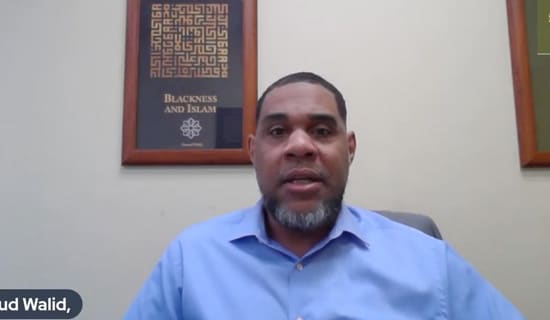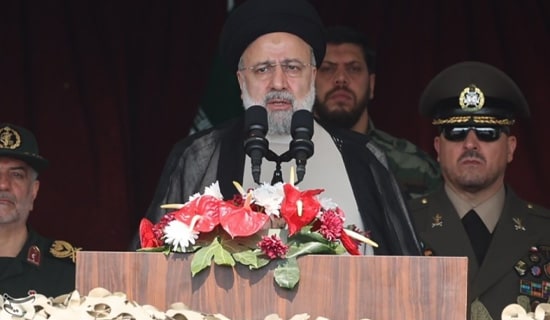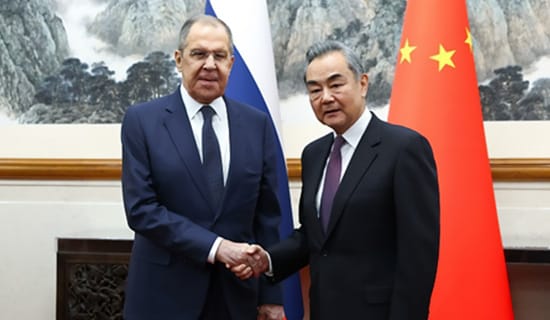A recent Islamic summit in Kuala Lumpur, Malaysia has become a source of conflict and tension in the Muslim world. The summit, to which 450 Muslim leaders, thinkers and researchers from across the world were invited, also included a summit meeting between Malaysian Prime Minister Mahathir Mohamad, Turkish President Recep Tayyip Erdogan, Qatari Emir Tamim bin Hamad Aal Thani, and Iranian President Hassan Rohani. The summit was regarded as a show of power by its main rivals – Turkey, Qatar and Iran, who support the Muslim Brotherhood (MB) and terror organizations like Hamas and Hizbullah – and as an attempt to challenge the status in the Muslim world of Saudi Arabia, which had been invited but declined to attend.
The tension surrounding the summit was noticeable even before it began, due to statements by the host, Malaysian Prime Minister Mahathir Mohamad, regarding its objectives. About a month prior, he had announced that his country would host a "narrow Islamic summit" of only five countries – Malaysia, Qatar, Turkey, Indonesia and Pakistan – which would form the kernel for broader Islamic cooperation on many issues concerning the Muslim world. He added that the summit would discuss a new strategy for dealing with the Muslim world's problems. Earlier, in July 2019, in a joint press conference with Turkish President Erdogan, Mahathir said that cooperation between Malaysia and Turkey, and later also Pakistan, could "revitalize Islamic civilization." [1]
Mahatir's statements were perceived as an attempt to create an alternative to the Organization of Islamic Cooperation (OIC), which Saudi Arabia heads, and therefore provoked the latter's anger. Seeing the Kuala Lumpur summit as a subversive move by its rivals in the Muslim world, it stressed that the OIC was the only appropriate forum for promoting goals related to the resolution of the Muslim world's problems. In the days leading up to the summit, Saudi Arabia therefore acted to thwart it by exerting political and economic pressure on Pakistan and Indonesia, which indeed prompted them to decide not to attend. At the same time, Saudi Arabia also took measures vis-à-vis the Malaysian prime minister in a bid to downplay the importance of the summit as much as possible. Following a phone conversation with Saudi King Salman, Mahathir emphasized that the narrow Islamic summit "was not meant to form a new bloc to supersede the OIC," adding, "we are too small to do such a thing." [2]
However, after Pakistan and Indonesia decided not to attend, the summit organizers announced that Iran would take their place, and the summit was thus held with the Malaysian, Turkish, Qatari and Iranian leaders, and reflected the emergence of an anti-Saudi Islamic axis comprising the states that support the MB – Turkey, Qatar and Malaysia[3] – and Iran, the patron of the Shi'ite militias in the Middle East.
In their speeches at the summit, the Muslim heads of state directed criticism at the OIC and thus indirectly at Saudi Arabia, and also criticized the policy of the U.S. Malaysian PM Mahathir lamented the crises and problems of the Muslim world and said that the Muslims have lost their honor in the eyes of the world. He also complained that certain Muslim countries with many resources are nevertheless "weak and unable to defend the Muslim nation."[4]
Turkish President Erdogan called for reforming the OIC, stating that the biggest problem of the joint Muslim forums is "the issue of implementation." He also called for changing the makeup of the UN Security Council, because "the world is bigger than the five countries" that constitute its permanent members, and because it does not represent the world's 1.7 billion Muslims.[5] Iranian President Rohani called on the Muslim countries to fight the "economic terror" of the U.S. and the hegemony of the dollar in the global market.
Economic issues, including the idea of finding an alternative to the dollar, appear to be one of the topics with which the summit was preoccupied. According to reports, the participants discussed a strategic economic development plan based on "the [economic] independence of the Muslim world and an international monetary system free of foreign hegemony." They also discussed a plan for a virtual currency to replace the dollar.[6]
At a press conference following the summit, Mahathir praised Iran for managing to maintain its stability and growth despite the sanctions on it, and praised Qatar for overcoming the boycott imposed on it by several Arab states. He added that "since there are countries in the world that take unilateral decisions to impose such sanctions," Malaysia and other countries must consider that they too might receive the same treatment; hence, Malaysia, Iran, Turkey and Qatar would continue discussing the option of using gold and barter-trade among themselves.[7]
The Arab and Muslim media dealt extensively with the summit even before it was held. Writers who supported it, including Erdogan's advisor Yasin Aktay, stated explicitly that its goal was to challenge Saudi Arabia's policy and find an alternative to its OIC. Conversely, Saudi writers expressed fury over the holding of the summit, and underlined Saudi Arabia's standing as the leader of the Muslim world.
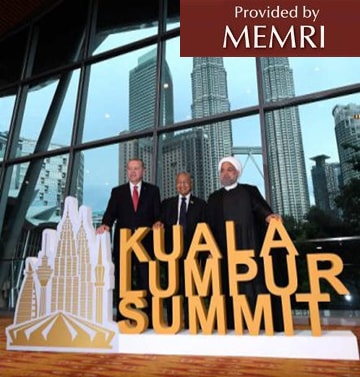
Iranian President Rohani, Malaysian Prime Minister Mahathir, and Turkish President Erdogan at the Kuala Lumpur summit (Source: raialyoum.com, December 19, 2019).
This report presents a sampling of the reactions to the Kuala Lumpur summit, published before the summit and after it.
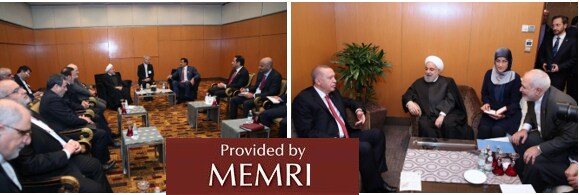
Rohani, Erdogan, and Qatari Emir Tamim bin Hamad at Kuala Lumpur summit (Source: Twitter.com/JZarif, December 19, 2019)
Expressions Of Support For The Summit: Saudi Arabia, Egypt, UAE Are The Source Of The Muslims' Suffering
The narrow Kuala Lumpur summit was extensively and positively covered in the pro-MB Arab media, and in the Qatari media in general. Social media posts by media figures and articles in the press welcomed the holding of the summit and hoped for significant and tangible action by the participants, while criticizing the performance of the OIC and arguing against Saudi Arabia's participation in the summit.
For example, when the summit was first announced, Qatari media personality Jaber Al-Harmi tweeted: "Turkey, Malaysia, Pakistan, Indonesia, Qatar – The yearned-for train of Islamic revival."[8]
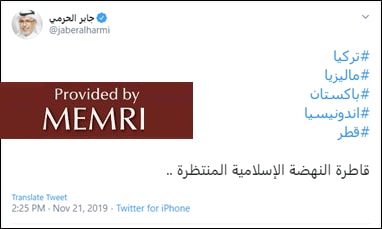
Al-Harmi's tweet
Kuwaiti MP Nasser Duwailah, an MB supporter, tweeted: "Five important Islamic countries... have announced the establishment of a new body that is the most important in the modern history of the Muslims, after the Muslim World League was emptied of all content. This is an attempt by those same Islamic states to stand against the East-West pact [apparently the pact between the Gulf states and the U.S.] against the Muslims' interests. We are grateful to them."[9]
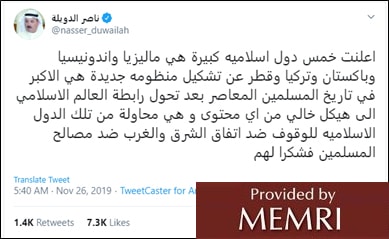
Duwailah's tweet
Iranian Foreign Minister Javad Zarif, who attended the summit, expressed great satisfaction with the meetings held there, tweeting: "Excellent and multilateral meetings with friends. Initiatives on good governance, inclusive dialogue, media, digital economy, tech r&d, innovation fund, trade & barter, alternative finance & unified cryptocurrency. Moving forward on inclusive synergy."
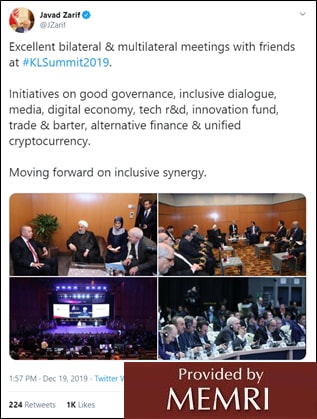
Zarif's tweet (Source: twitter.com/JZarif, December 19, 2019)
Advisor to Turkish President Erdogan: The OIC Is Not Handling The Muslims' Problems; "Today Saudi Arabia Is Very Far From Claiming Custodianship Of The Two Holy Cities"
On November 25, the Al-Jazeera website published an article by Yasin Aktay, advisor to Turkish President Recep Tayyip Erdogan, titled "The Kuala Lumpur Summit: Does It Replace the Organization of Islamic Cooperation [OIC]?" In the article, Aktay said that the Saudi-headed OIC and its member states are mot only neglecting the problems of the Muslims in the world, but are to blame for them. He added that although the Kuala Lumpur summit does not presume to present itself as an alternative to the OIC, in light of the situation the elements convening in it would take it upon themselves to tackle the crises in the Islamic world that are not being properly handled. He wrote:
"What is behind the embarrassment in Saudi media, and the fact that it has mobilized all its forces and launched a terrified campaign against this [Kuala Lumpur] summit from the moment it was announced? Was this summit created as a replacement for the OIC, or [to come out] against the notion, held by some, that Saudi Arabia has a natural authority [in the Muslim world] by virtue of the fact that Mecca and Madina [are within its borders]?... From the very beginning, this summit denied that it constitutes a replacement [for the OIC], [claiming that it] was [created] in order to provide what the OIC had not managed to provide.
"Unfortunately, today the OIC is not a body that either deals with or solves the problems and crises of the Muslims. With regard to Saudi Arabia, it is today very far from claiming custodianship of the holy cities [Mecca and Madina]. Had Saudi Arabia leveraged its international relationships, [which it maintains] by virtue of its economic power, it could have easily provided Muslims worldwide with a secure, stable, and dignified life. This situation [i.e. that it could have but did not do so] is tragic, but this is a fact. We cannot say that Saudi Arabia, the UAE, Egypt, and other powerful countries appear to be acting to find solutions to make things better for Muslims in Myanmar, Kashmir, Palestine, Turkestan, and Syria. [Worse,] they are the main reason for the situation of the Muslims in Yemen, Libya, and Egypt. They are completely absent [from activity] addressing the dangers that are expanding in the world and threatening Islam and the Muslims – that is, the spread of hatred and enmity towards Islam...
"The Kuala Lumpur summit has no intention of presenting itself as a replacement [for the Islamic leadership], but when people who need to prove their problem- and crisis-solving ability do not do so, [others] who are better [at doing so] than they are will fill the vacuum, in their dedication to tackle those crises..."[10]
Columnist In Qatari Daily: We Are On The Threshold Of A New Era In Which A Promising Islamic Bloc Emerges
Ibrahim Al-Sadah, columnist for the Qatari Al-Arab daily, expressed his hope that the five countries at this small Islamic summit that together hold considerable political, military, and economic power would play an active role in solving the problems of the Muslim nation, at a time when the OIC is divided and paralyzed. He stressed that these countries support resistance to Israel and thus will earn the respect of the world that, he says, understands only the language of power:
"A few days separate us from a tremendous event that will likely impact the process of affairs in the Middle East, and will perhaps even spread to other neighboring [regions], after Malaysian Prime Minister Mahathir bin Mohamad announced that his country would host a small-scale Islamic summit...
"A brief glance at the political reality of the five countries [participating in the summit]... at their development and at their military capabilities clarifies to us the extent of the power of this coalition, the harmony [within it], and its weight, and thus also its chances of success at creating a more dynamic environment for dealing with matters concerning the countries of the new coalition, and playing an active role in the issues of the Islamic nation. This is when we see that it seems, on the other hand, that the OIC is riven with division; its activity is paralyzed, and it is being dragged into international and regional matters that serve neither the interests nor the future of the Islamic peoples. The population [of the countries] of this new coalition constitutes nearly half the population of the OIC member countries – making these five countries the Muslims' center of gravity...
"This coalition, if that is what it can be called, stretches from Europe – Turkey's Istanbul – through [Qatar in] the Arab Gulf and Pakistan, that overlooks the Arabian Sea, all the way to South Asia – Malaysia and Indonesia, on the cusp of South Asia – a distance covering nearly half the diameter of the globe...
"The troops of the military forces of the countries at this small-scale summit number about half of [those] in the armies of all the Islamic states [combined], and they [the countries at the summit] have greater capabilities in all areas of the military industry; Turkey plays a central role for each one of these five countries.
SUPPORT OUR WORK

"Qatar is considered the third-largest producer of natural gas in the world; it provides Pakistan with this essential energy, while by 2021 Malaysia is expected to head the list of Asian bio-gas producers. This clarifies the chances of integration among these five countries with regard to energy – except for Indonesia, which has enough gas for its needs – since Turkey is considered one of the largest consumers of natural gas...
"There is no doubt that we are on the threshold of a new era, during which we anticipate the emergence of a promising Islamic bloc united by clear shared issues and goals. The facts and dimensions presented to us clarify to us the might and importance of this coalition, and underline that its political, economic, and military weight can play an important and influential role on the global level.
"Beyond this, these five countries have a common denominator, as well as many shared positions and interests. This allows them to overcome the consequences of the OIC's flawed handling of the affairs of the [Islamic] nation, which gave the regional and international forces an opportunity to completely take over the holy places and resources of the Islamic peoples, to interfere in their affairs, and to extort them politically and economically in front of the entire Islamic world. The five countries also share a positive [position] on the issues of the Islamic peoples, particularly vis-à-vis the Palestinian people; they see resisting the Israeli occupation and struggling against it on all international forums as legitimate. Additionally, these countries have functional governments, and they have freedom of opinion and aspire to fight corruption...
"I think that these countries have a tremendous opportunity to reshape the meaning of Islamic cooperation in the hearts of the Muslims, and to weave a strong fabric capable of actualizing the aspirations of the Islamic peoples based on respecting human dignity and prioritizing the strategic interests of the Islamic nation over narrow short-term interests. In light of this, this coalition deserves the respect of a world that understands only the language of power, with all its political, economic, and military ramifications."[11]
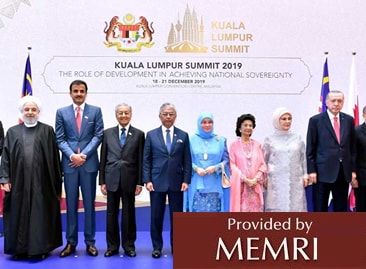
Opening of the summit. Among those pictured are Erdogan, Rohani, Tamim, and Mahathir (Source: dailytimes.com.pk, December 23, 2019)
Al-Jazeera Presenter: Turkey Is Much Closer To The Arab Peoples Today Than Saudi Arabia, UAE
Al-Jazeera presenter Faisal Al-Qassem wrote: "We are facing a covert conflict on the [pan-]Arab and [pan-]Muslim level, which the experts and analysts have not properly grasped. This great battle between Saudi Arabia and Turkey is the significant turning point and the main factor that will determine the future of the entire region and the entire Muslim world. For Turkey is now a force reemerging from [the mists of] the past, armed with regional economic, Islamic and even military projects through which it aspires to take the helm of the Arab and Muslim world. To this end, it is taking advantage of the beginning collapse of Saudi Arabia's dominance over these projects and its growing detachment from the pains of the Muslims and Arabs. Furthermore, the Arab public is beginning to lose its faith in Saudi Arabia's ability to play and active role in resolving its crises and in supporting it...
"Turkey is now much closer to the Arab peoples than Saudi Arabia and the UAE. If you say one word about Saudi Arabia, the UAE, and their allies within these peoples' earshot, you will see them repressing their anger, if not worse. Furthermore, Turkey's policy in the Arab and Muslim region is becoming totally clear. [It is clear] from its intention to first of all let the Arab peoples lose their faith in Saudi Arabia and the UAE, and then come roaring in through the main gate [to take their place] and be received with rice and flowers. Meanwhile, Turkish President Erdogan tirelessly delivers religious speeches and [convenes] summits calling for Muslim unity. The Kuala Lumpur summit is the latest front [in the battle] between Turkey and Saudi Arabia. Saudi Arabia opposed this summit... understanding very well that its participation in it would mean pulling the rug from under the OIC, which [Saudi Arabia] leads...
"The current stage is marked by the collapse of the Saudi role and the rise of the Turkish one. This conflict is bound to grow steadily worse, with each side trying to impose its view by every possible means, whether political, religious, military or other. The [current] events in Libya prove that the battle between Saudi Arabia and Turkey for the leadership of the Muslim world has already begun to take the form of imposing equations by force. If Turkey manages to replace Saudi Arabia as the leader of the Muslim and Arab world – and unless something unexpected happens, things certainly seem to be headed in that direction – within two decades it will restore its past glory, and it may lead the Arabs and Muslims for several decades. But this will not be achieved by restoring the Muslim caliphate, as some people imagine, but rather in new ways and by modern means, through which Turkey will first of all gain the peoples' [loyalty]..."[12]
Editorial In Qatari Daily: Saudi Arabia Must Recognize That Its Standing In The Arab World Has Declined
An editorial in the Qatari London-based daily Al-Quds Al-Arabi, published on the day of the narrow summit, stated: "...Despite the obstacles placed in its path, a summit attended by 450 leaders, thinkers and intellectuals from across the Muslim world can form the kernel of a new Islamic leadership. This is because it dares to raise issues that the other Islamic institutions – such as the OIC, the Islamic flagship of the Saudi axis – tend to evade, and also because the emergence of a different Islamic leadership reflects the crucial need to contemplate [the state of] the Muslim peoples and unite in order to strengthen this region's influence instead of letting the Muslim countries continue to play a secondary role...
"Iran's participation in the summit evoked opposition of a political and ideological nature, due to the well-known role that Iran is playing in Iraq, Syria, Yemen and Lebanon, and also due to its authorities' violent handling of the [current] popular protests. But [this attitude towards Iran] could have been counterbalanced... had Saudi Arabia decided to attend the Kuala Lumpur summit instead of pressuring Pakistan and other countries [not to attend it]... and had it recognized that, despite its symbolic importance as the cradle of the Islamic message, its image is beginning to significantly decline, not just in the eyes of the Muslim peoples and governments but in the entire world. The hollow [nature of] Saudi Arabia's arrogance, and the vast discrepancy between its symbolic image and the reality on the ground, now force Saudi Arabia to recognize its current state, for that is the best way to improve [the situation] and sustain the desired Muslim leadership."[13]
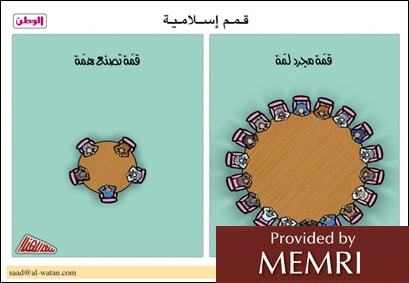
Cartoon in Qatari daily: On the right: "Summit for the sake of a summit"; on the left: "Summit for the sake of action" (Source: Al-Watan, Qatar, December 20, 2019)
Reactions In Saudi Arabia, UAE: The Summit Is Motivated By Hatred For Saudi Arabia And Is An Attempt To Take Over The Arab World
Reacting to the summit on social media, officials and media personalities in Saudi Arabia and the UAE condemned it as an attempt to undermine the OIC and Saudi Arabia's status as the leader of the Muslim world, and said that the summit would not change the power relations in the Arab world one whit. UAE State Minister for Foreign Affairs, Anwar Gargash, tweeted: "The weakening of the OIC is not to the advantage of the Islamic world and its states. [The adoption of] a policy of axes against the organization and its members is shortsighted and not smart. Consensus and a united message, despite the occasional difficulty in arriving at them, are also more influential than [operating with] selective axes and division, and time has proven this to be so."[14] During the summit he tweeted: "Can the Muslim world awaken without the Arab presence? Can it awaken without Saudi Arabia and [Egypt's] Al-Azhar?"[15]
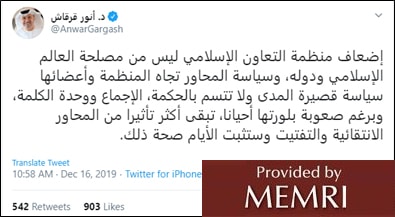
Gargash's tweet
Saudi columnist Hailah Al-Mashawah tweeted: "This [Kuala Lumpur] summit will never liberate Jerusalem. It will not face down the terrorism in Iran, and it will not put an end to the tragedies of the Islamic peoples. Moreover, this summit is motivated by jealousy and hatred against Saudi Arabia, with no constructive goal."[16]
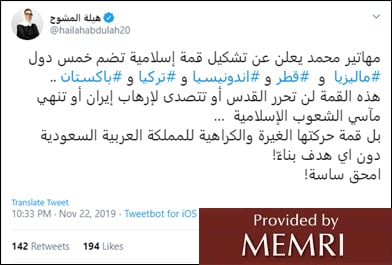
Hailah Al-Mashawah's tweet
Abdallah Al-Bander, a Saudi presenter on Sky News Arabia, tweeted: "When you see this summit you immediately recall the previous Islamic summits held without Saudi Arabia in an attempt to distance it from the leadership of the Islamic [world]. [But] they failed in all aspects, and everyone [eventually] returned to the land of the two holy sites [i.e. Saudi Arabia]."[17]
Editor Of UAE Daily: The Emerging Bloc Will Not Change The Status Of Saudi Arabia Or Al-Azhar In Egypt
These messages were repeated in articles in the Saudi and UAE press. In one article, Hamad Al-Ka'abi, editor of the UAE daily Al-Ittihad, stressed that a clear political bloc is emerging to challenge today's Islamic leadership, but that it would not achieve this goal. He wrote:
"These five countries [Indonesia, Pakistan, Malaysia, Turkey, and Qatar] intend to unite into a small-scale bloc, and have chosen what appears to be an axis that was not sponsored by the [OIC] Islamic summit [on May 31-June 1, 2019] but is outside it, as can be understood by the recent polarization in the region. [This axis] is exacerbating the disagreements, in more than one direction...
"What is the significance of convening a narrow summit without Saudi Arabia, Egypt, and the UAE – when at the same time Malaysia's prime minister states that it is not a replacement for the OIC? ... The unification into a clear political bloc is obvious, but not its timing, because [this bloc] will not change the Muslims' place of worship [i.e. Mecca and Madina], nor [Saudi Arabia's] status, nor the spiritual centrality of Al-Azhar [in Egypt], nor the aspirations for human fraternity across the entire Islamic world."[18]
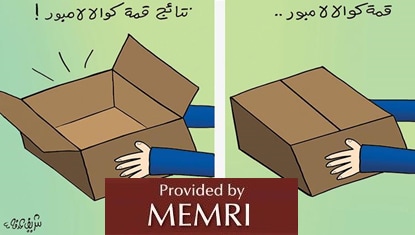
Cartoon in UAE daily: On the right "The Kuala Lumpur summit"; on the left: "The outcomes of the Kuala Lumpur summit!" (Source: Al-Ittihad, UAE, December 23, 2019)
Saudi Columnist: Iran And Turkey Are Trying, With Qatar's Help, To Conquer Mecca And Establish A Non-Arab Caliphate
Muhammad Al-Sa'ed, columnist for the Saudi 'Okaz daily, wrote that the real aim of the Kuala Lumpur summit was to remove Saudi Arabia from its position as servant and custodian of the mosques in Mecca and Madina, and even to take Mecca away from the Saudis in order to control the Arab world. He added that both Turkey and Iran are dreaming of reestablishing the empires of their past, and that today they are using an Islamic narrative to do so. He wrote:
"...The Persians, and after them the Turks, continued to feel a sense of cultural superiority [over the Arabs] that has never ceased since they became Muslims – because the Iranians see the Arabs as mere Bedouin shepherds, and the Turks see them as 'traitors' because they opposed the Turkish conquest. Accordingly, the Persians and the Turks became the blades of two daggers [stabbed into] the center of the Arab space, resenting the past and dreaming of a future in which they regain empires that ceased to exist... [even] before the[se empires] were destroyed by the Arabs. But this time, it is [being done] in the guise of the religion of Islam...
"For 1,400 years, the Muslims gave the leadership of the Islamic world to the servant of the Ka'aba mosque in Mecca and the Prophet's Mosque in Madina. This was the basic equation until the MB arrived, with a new theory. It believes that Mecca and Madina are just small cogs in a great imperialist dream, just two holy cities that allow their servants [the Saudis] to take over decision-making for the [Muslim] peoples in the name of these cities. The war today is not a struggle for influence, but an attempt to establish new empires at the expense of the old states...
"The real goal of establishing this coalition including [countries ranging from] Turkey through Iran, Pakistan, Indonesia, Malaysia, and Qatar, and that will perhaps later on include Iraq and Hamas, is to topple Saudi Arabia from its position as the servant and custodian of the Ka'aba mosque in Mecca and the Prophet's Mosque in Madina, and even to occupy and seize Mecca, in order to build the dream of 'a non-Arab caliphate.' This plan is more political than religions, and as state-building theories go, in order to come into being [a state] must be based in religious theory.
"Perhaps the worst thing in the Turkish-Malaysian plan is that there is a traitor in the 'Arab palace' [i.e. Qatar]... [who is helping them] destroy the role of Mecca to benefit Istanbul, Tehran, Karachi, Jakarta, and Kuala Lumpur."[19]
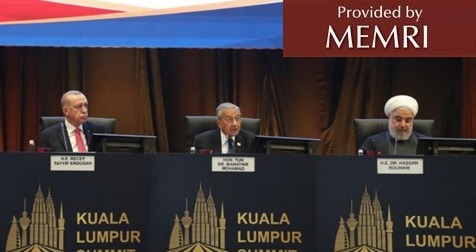
Rohani, Mahathir and Erdogan at the narrow Kuala Lampur summit (Source: 'Okaz, Saudi Arabia, November 25, 2019)
Senior 'Okaz Journalist: The Summit Of Treachery Has Failed; Erdogan Is A Dagger For Stabbing The Muslim World
In an article published upon the close of the summit, 'Okaz deputy-editor Fahim Al-Hamed harshly attacked Erdogan, writing: "Erdogan's Turkish regime clearly lives on another plane, in a virtual world disconnected from reality, where policy is based on harming the interests of the Muslim nation, endangering the Muslim world, dismantling the nation and driving a wedge in joint Islamic action. The conspiracy summit in Malaysia exposed the fact that Erdogan, who belongs to the Muslim Brotherhood, has failed to realize one of the political dreams he has harbored since assuming office, namely [the dream of] becoming a recognized leader of the Muslim world. The summit of helplessness and political treachery failed to achieve its dubious goals, and its participants, those plotters against the Muslim nation, went back to where they came from.
"Erdogan has proved he is the godfather of the nation's destruction and the dagger stabbing the Muslim world. The summit of damage exposed the true face of the terrorist Turkish regime, which supports the rule of the jurisprudence [i.e., the Iranian regime], the ideology of the Muslim Brotherhood and the dark ideology of sectarianism. [This Turkish regime] believes only in itself, and suffers from delusions and diplomatic immaturity that has caused Ankara to isolate itself, distrust others and reach the point of senility and political helplessness.
"The leaders of the Muslim nations rejected the calls of the summit of treachery which Muslim Brotherhood member Erdogan organized along with four other conspirators against the Muslim world with the aim of harming the Muslim nation and dismembering the Muslim body.
"It is not the interest of the Muslim world and its countries to weaken the OIC. A policy of axes vis-à-vis this organization will only divide the nation. Erdogan, who has been proved to be the mastermind behind the summit of treachery, must realize his resounding failure in forming a new entity and presenting it to the world as a leader of the Muslims. This was a summit of damage, division and civil war. Erdogan's regime [is characterized by] political helplessness and regression. This is childish behavior..."[20]
Editorial In Saudi Al-Riyadh Daily: Saudi Arabia Is The Leader Of The Islamic World
An editorial in the Saudi daily Al-Riyadh stated: "There is not a single Muslim on the face of the earth who does not want the Muslim countries to attend a summit of cooperation and solidarity... for this greatly benefits the nation...
"Saudi Arabia is the Land of the Two Holy Places [Mecca and Madina] and the place of the Revelation, and it was the first to unite the Muslims and strengthen their standing vis-a-vis the world. It was the one that fought for every Muslim cause, in every forum, by means of political, economic and developmental support. All this and more has made Saudi Arabia the leader of the Muslim world and the one that unites the Muslims with great competence – and nobody will deny this except for resentful ingrates and people who seek illegitimate glory at the expense of the might and unity of the Muslim world. That was the actual essence of the Kuala Lumpur summit, and the countries that attended it are clearly unaware of what they are doing, for what they are doing lacks any direction, meaning or foresight into the supreme interests of the [Muslim] nation, the chief of which is Muslim unity."[21]
[1] Aljazeera.net, November 21, 2019.
[2] Ajel.sa/KNYzfy, December 18, 2019.
[3] MB-affiliated figures were indeed prominent at the Kuala Lumpur summit. Two of its deputy chairmen were Sheikh Muhammad Al-Hassan Ould Al-Dadou Al-Shanqiti of Mauritania and Erdogan's brother-in-law Berat Albayrak, who is affiliated with the global MB (alarabiya.net, December 19, 2019). The summit secretary-general was Dr. 'Abd Al-Razzaq Maqri, head of Algeria's MB-affiliated Movement of Society for Peace (klsummit.my/members). Also present at the summit were 'Ali Al-Qaradhari, head of the International Union of Muslims Scholars (IUMS), and Sudanese cleric 'Abd Al-Hayy Yousuf, who in the past expressed support for ISIS and prayed for the soul of Al-Qaeda leader Osama bin Laden (alarabiya.net, December 19, 2019). A Hamas delegation attended as well (Al-Quds, East Jerusalem, December 18, 2019; aa.com.tr, December 18, 2019). Al-Jazeera was the official sponsor of the summit (aljazeera.net, November 21, 2019).
[4] Al-Quds Al-Arabi (London), December 22, 2019.
[5] Dailysabah.com, December 19, 2019.
[6] Iumsonline.org, December 17, 18, 2019.
[7] Alaraby.co.uk, December 21, 2019.
[8] Twitter.com/jaberalharmi/status/1197611945769230342, November 21, 2019.
[9] Twitter.com/nasser_duwailah, November 26, 2019.
[10] Mubasher.aljazeera.net, November 25, 2019.
[11] Al-Arab (Qatar), December 12, 2019.
[12] Al-Quds Al-Arabi (London), December 20, 2019.
[13] Al-Quds Al-Arabi (London), December 19, 2019.
[14] Twitter.com/AnwarGargash, December 16, 2019.
[15] Twitter.com/AnwarGargash, December 20, 2019.
[16] Twitter.com/hailahabdulah20, November 22, 2019.
[17] Twitter.com/a_albander, November 22, 2019.
[18] Al-Ittihad (UAE), November 24, 2019.
[19] 'Okaz (Saudi Arabia), November 25, 2019.
[20] 'Okaz (Saudi Arabia), December 22, 2019.
[21] Al-Riyadh (Saudi Arabia), December 21, 2019.


